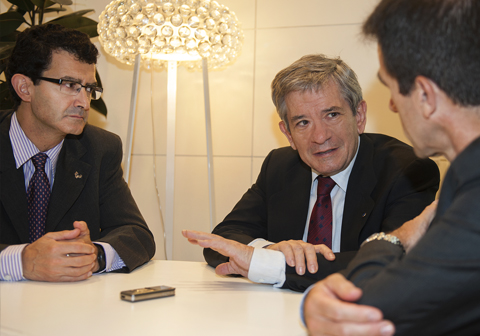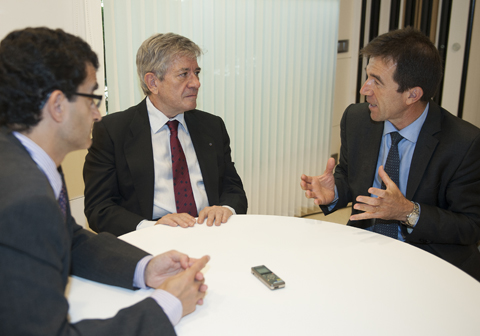Within the framework of the Courses on International Law and International Relations being run by the UPV/EHU-University of the Basque Country, Vitoria-Gasteiz City Council has awarded the "Francisco de Vitoria" medal to Jacques Delors, the former president of the European Commission between 1985 and 1995. This honorary distinction recognises Delors as a key figure when it comes to understanding Europe's main advances over the last few decades. The medal was collected by Enrique Barón, who presided over the European Parliament between 1989 and 1992 and collaborated with Delors during what was a key phase for the European Union.
Enrique Barón, economist and lawyer, former president of the European Parliament from 1989 to 1992
«Europe is an emerging power, the invisible superpower»
First publication date: 14/07/2017

Also participating in the interview were Juanjo Álvarez, professor of Private International Law at the UPV/EHU and independent expert appointed by the European Commission for the areas of freedom, security and justice, and José Luis de Castro, tenured lecturer in International Relations and holder of a Jean Monnet Chair.
In 1989 you took over the presidency of the European Parliament. At that time how did you imagine what today's Europe would be like 28 years later?
I wanted a stronger, more united Europe. And we haven't fully achieved that, but when I was elected president of the European Parliament, the European Community numbered 12 States with about 380-390 million inhabitants. Now, in spite of everything, and our passion to berate ourselves, there are 500 million of us waiting to see what happens with Brexit. We number 28 States, there will be 27 of us, but there is a waiting list. We have a single currency, and a shared citizenship, and we have created a European Union, and there are those who say without even being European that we are an invisible superpower. And that's the challenge we are facing.
And how is Europe faring right now? Is it in good health?
The 60th anniversary of the Treaty of Rome has just been celebrated, and despite all our differences, we have all celebrated it and have signed a joint declaration earmarking important priorities with the future in mind: to drive forward the construction of Europe; to strengthen what was the initial project and develop it; to give it a political dimension with special attention devoted to security and even defence, in terms of positioning ourselves as Europeans in today's world rather than navel-gazing¬. And it needs to be given a social soul again and we need to return to the European social network; and then the economic and monetary union needs to be strengthened.
Can you see a critical mass right now for moving forward in the area of security?
I regard the subject of security as crucial, because the European Union is surrounded by the greatest number of open conflicts in the world. They range from Ukraine to Afghanistan and all the way to Somalia, not to mention the black hole of Libya and the rest, and the whole situation in the Middle East, the disaster of the explosion begun in Iraq and then in Syria, the Arab-Israeli conflict, which is always simmering… We have to be aware of that, and of something else, too: we are a paradise for those around us; we undoubtedly have many problems but those who pluck up the courage to cross the Mediterranean at risk of drowning believe they are arriving in a paradise. And it isn't just the refugees. To the south we have a continent with a huge demographic dynamic which is Africa. We have a lot at stake there and that means we have to be more aware in matters of security policies.
Who is being held to blame as regards the refugee drama?
It isn't possible to point to a general cause: the Swedes top the list in terms of solidarity, in terms of asylum. And so does Germany, and what is more, Germany has done this not just for economic and demographic reasons, but more than anything else, out of a political obligation they feel, because it was asylum that enabled German democrats to survive. Spain is a country in which the democrats have survived nearly two centuries thanks to the right to asylum and there isn't much in the way of generosity, or of memory, either. Everyone has to consider the circumstances of their own abode.
In the issue of the refugee crisis, I think one has to say that the response has not been perfect, that Europe has not been present at the origin of the problem, that we are not sufficiently active, but it is also true that Europe is the one that is handling the whole humanitarian issue, and not so much the issue of sending arms to the area, which others are doing much more effectively.
University students, who have not lived through the reasons why Europe emerged, and who have already lived through the Erasmus generation, assume that it is the natural order of things, and that may be why they fail to appreciate the costs of an eventual non-Europe…
What is happening to the Erasmus generation? As far as they are concerned, Europe is a territory that is part of their dimension, and their natural habitat, and I believe that is highly positive. So much so that one subject of discussion in the case of Great Britain is the fact that there is a social debate about why the Cameron government was interested in holding a referendum at a moment when the universities had broken up and the students were scattered. And they have paid for that. And right now, in the British debate, which is not over yet —it has been notified and they've barely started to negotiate—, is the fact that there are no internal frontiers, the possibility of studying and living in a territory like the European Union, the fact that there are research and development programmes… I believe it is the natural habitat. And I see that whenever I go to universities and debates: it seems to me that it is among the subjects that are always current and mobilising.
Is Europe an emerging power or in decline?
Emerging and becoming consolidated. And it is no exaggeration to talk about an invisible superpower. And what is more, our existence is at stake: either we succeed in consolidating it, or if not, we disappear from history.
Europe has the world's second reserve currency, it is the leading trading power, it embodies the European social model… When you go to one of Beijing's top universities and one of the lecturers says: "You have no idea how popular the European social model is in China"; well, defend it, don't dismantle it. And then you go around America, Africa, Asia and the demand that there should be a European prominence and presence is huge, from outside, too. But it is invisible: the thing is, we can't see it ourselves! The first step we have to take is to believe in it.



